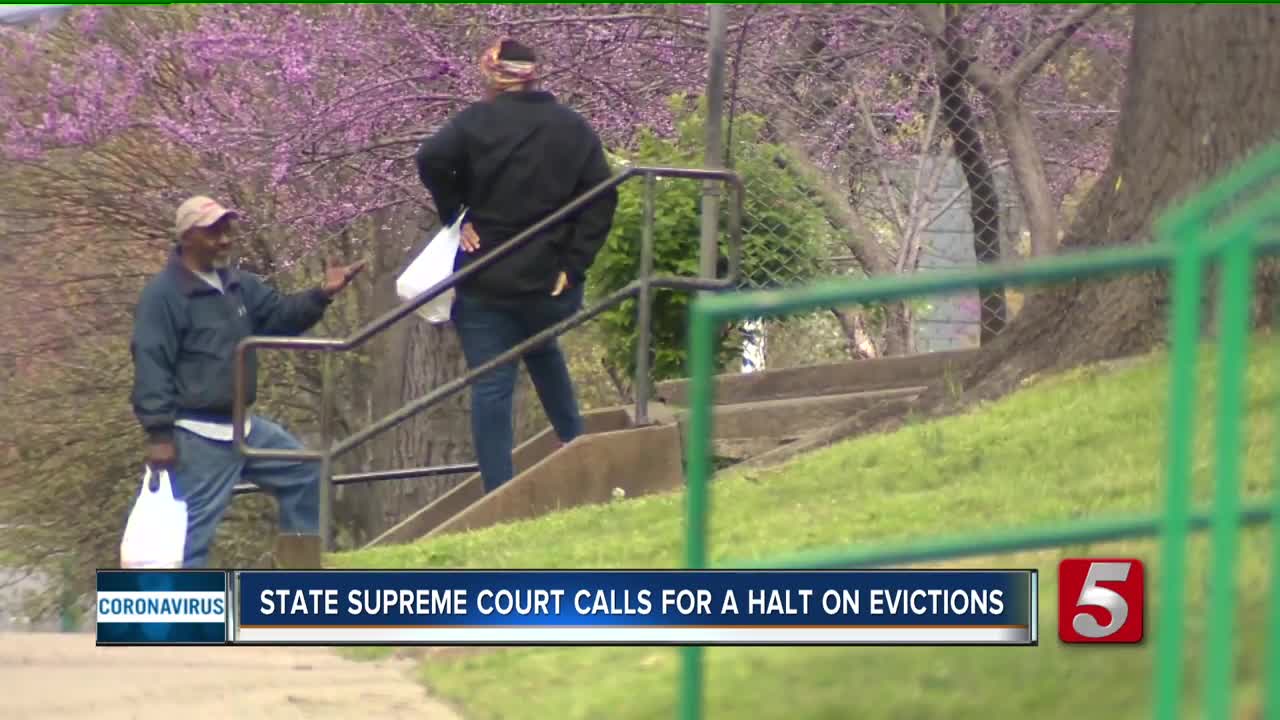NASHVILLE, Tenn. (WTVF) — Eviction protection is being offered at the state and local level, as families struggle to find work and resources.
The Tennessee Supreme Court has announced they will halt evictions until at least April 30. Meanwhile, Davidson County says they too will not process any evictions through the General Sessions Courts of Metropolitan Nashville and Davidson County, as a result of COVID-19.
Typically an eviction hearing requires the landlord and the tenant, but with the threat of COVID-19, the courts agree these matters can wait.
Davidson County Sheriff’s deputies say they too will refrain from serving Detainer Warrants or enforcing any Writs of Restitution, at this time.
While you will have to check with your county officials, most have already adopted the lead of the Supreme Court and other states across the country.
That includes restricting landlords from taking certain actions against tenants like cutting off utilities, changing locks or cleaning out the home.
We spoke with one single mother who tells us she received an email from her job tell her she had been furloughed. She’s had trouble finding help from a variety of social services, mainly because they seem to think she doesn’t have enough proof to suggest she’s not working.
“It hasn’t been easy, don’t know when we’re going to see the light at the end of the tunnel,” she said.
There are homes like those owned by the Metropolitan Development and Housing Agency, where they allow renters to make payment adjustment without penalty if they’re affected by COVID-19.
Jamie Berry of MDHA says her group has noticed a dramatic need for more housing, as Nashville is still feeling the ripple effect of a devastating tornado and now a deadly virus.
“Renters here will never pay over 30 percent of their adjusted income. So if they have a loss of income, they need to report it to their property manager,” said Berry.
Other groups like The Metropolitan Action Commission receives federal funding through the Community Service Grant and they say they can help with rent, mortgage, rentals, property taxis and utility deposits. They also mention they receive funding through Low Income Home Energy Assistance Program, which helps with utility payments such as electric and natural gas.
Applications can be found at www.nashville.gov/mac
There you can see if you qualify for help. You can also print out the application, fill-in your information and drop off the application at the Clifford Allen Building, 802 2nd Avenue North.
MORE TENNESSEE COVID-19 COVERAGE
- Mask mandate, capacity restrictions lifted in Nashville; what you need to know
- Tennessee, Metro to offer COVID-19 vaccine to children 12-15 years old
- Nashville's COVID-19 testing centers to adjust operating hours
- Walmart pharmacies in Tennessee now offering COVID-19 vaccines
- Donate to the COVID-19 Middle Tennessee Emergency Response Fund
See all our coronavirus coverage here
COUNTY-BY-COUNTY CASES IN TENNESSEE
What is COVID-19 (a.k.a. the new coronavirus?)
According to the World Health Organization, coronaviruses (CoV) are a large family of viruses that cause illness ranging from the common cold to more severe diseases. Examples include the Middle East Respiratory Syndrome (MERS-CoV) and Severe Acute Respiratory Syndrome (SARS-CoV). A novel coronavirus (nCoV) is a new strain that has not been previously identified in humans. COVID-19 stands for "Coronavirus disease 2019," which is when this strain of the coronavirus was discovered.
What are the symptoms?
The CDC says patients confirmed to have the 2019-nCoV reportedly had mild to severe respiratory illness with:
- Cough
- Shortness of breath or difficulty breathing
Or at least two of the following symptoms:
- Fever
- Chills
- Repeated shaking with chills
- Muscle pain
- Headache
- Sore throat
- New loss of taste or smell
At this time, the CDC believes symptoms could appear as soon as two days after exposure, or as long as 14 days.
Prevention
The CDC is recommending "common sense" measures such as:
- Wash your hands often with soap and water for at least 20 seconds. If soap and water are not available, use an alcohol-based hand sanitizer.
- Avoid touching your eyes, nose, and mouth with unwashed hands.
- Avoid close contact with people who are sick.
- Stay home when you are sick.
- Cover your mouth and nose with a cloth face cover when around others.
- Cover your cough or sneeze with a tissue, then throw the tissue in the trash.
- Clean and disinfect frequently touched objects and surfaces.




